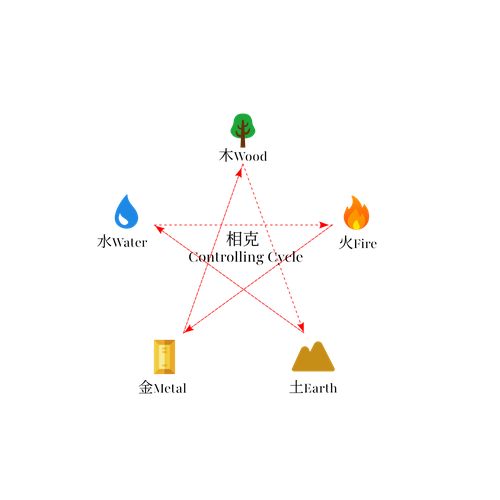Understanding the Five Elements in BaZi
Oct. 17, 2025
At the heart of BaZi lies the ancient philosophy of the Five Elements (五行, Wu Xing): Wood, Fire, Earth, Metal, and Water. These five forces form the energetic blueprint of everything in the universe — including you. In BaZi, every person’s birth chart reflects how these five energies interact and balance within their life. Understanding them helps you make sense of your personality, relationships, strengths, and challenges.
The Five Elements and Their Nature
| Element | Nature | Season | Qualities |
|---|---|---|---|
| Wood (木) | Growth, expansion | Spring | Creative, idealistic, compassionate |
| Fire (火) | Activity, passion | Summer | Energetic, expressive, enthusiastic |
| Earth (土) | Stability, nurturing | Late Summer/transition | Reliable, supportive, thoughtful |
| Metal (金) | Structure, refinement | Autumn | Disciplined, courageous, principled |
| Water (水) | Flow, wisdom | Winter | Flexible, introspective, resourceful |
Each element has both Yin and Yang aspects — representing the balance between active and receptive energy.
For example, Yang Fire burns brightly like the sun, while Yin Fire flickers gently like a candle.
How the Five Elements Interact
The beauty of BaZi lies not in isolated elements but in their interactions.
They follow three natural cycles:
- The Productive Cycle (Generating Cycle)
Each element supports the next — like a chain of growth:

- Wood fuels Fire
- Fire creates Earth (ash)
- Earth bears Metal
- Metal enriches Water (through condensation)
- Water nourishes Wood
This cycle represents growth, support, and harmony.
2. The Controlling Cycle (Regulating Cycle)
To maintain balance, each element also controls another:

This ensures that no element becomes too dominant — an essential principle in BaZi chart interpretation.
3. The Weakening Cycle
When one element produces another, it becomes slightly weakened — for example, Fire loses energy when it creates Earth.
Recognizing these subtler interactions helps in fine-tuning BaZi readings.
Element Balance and Personality
A well-balanced BaZi chart has harmonious relationships between the Five Elements.
However, imbalance is natural — and often what gives each person their unique strengths and growth areas.
For example:
- A Wood-dominant person may be creative and visionary, but sometimes impatient or scattered.
- A Metal-strong chart may show discipline and courage, but also rigidity or perfectionism.
- A Water-heavy person may be wise and adaptable, yet overly cautious or withdrawn.
BaZi analysis helps identify which elements are too strong or too weak, guiding you to restore balance through choices in lifestyle, timing, and environment.
Why the Five Elements Matter in BaZi
In a BaZi chart, every pillar — representing year, month, day, and hour of birth — contains elements.
By studying how they combine, clash, and support one another, BaZi reveals:
- Your core nature (Day Master element)
- Your favorable and unfavorable elements
- The cycles when certain energies rise or weaken
- How to align with your most supportive energy for success and well-being
Understanding the Five Elements is like learning the alphabet of BaZi — it’s the foundation upon which all deeper insights are built.
Next in the Series
In the next article, we’ll explore “The Heavenly Stems and Earthly Branches Explained” — the system that encodes time, energy, and interaction in BaZi.
It’s how the Five Elements express themselves through the cycles of years, months, days, and hours.
Explore Your Own Element Balance
Curious which elements dominate your chart?
👉 Try the Free Bazi Calculator to generate your own chart instantly.
Discover your Day Master, elemental balance, and more.